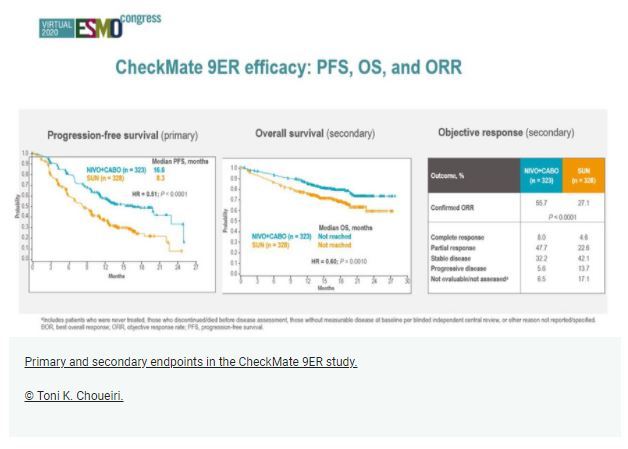The combination of nivolumab and cabozantinib provides a new first-line treatment option in advanced clear cell RCC
ESMO Virtual Congress 2020 Sep 24, 2020
Efficacy data with nivolumab plus cabozantinib showing improved survival and response rates, together with an acceptable safety profile presented by Prof. Toni K. Choueiri of the Dana-Farber Cancer Institute and The Lank Centre for Genitourinary Oncology in Boston, USA at ESMO Virtual Congress 2020, support this combination as a first-line treatment option for patients with advanced clear cell renal cell carcinoma (RCC).
Prof. Choueiri presented first results from the phase III CheckMate 9ER study evaluating nivolumab plus cabozantinib compared with sunitinib as first-line treatment of advanced clear cell RCC. This study was prompted by reports that both nivolumab, a checkpoint inhibitor and cabozantinib, a tyrosine kinase inhibitor (TKI) administered as monotherapies demonstrated efficacy and a manageable safety profile in advanced RCC. Prof. Choueiri and colleagues reasoned that the immunomodulatory properties of cabozantinib may counteract tumour-induced immunosuppression.
In CheckMate 9ER patients were stratified by IMDC risk score, tumour PD-L1 expression, as well as region and randomised 1:1 to receive a 240 mg flat dose of i.v. nivolumab every 2 weeks plus oral cabozantinib at 40 mg once daily or oral sunitinib at 50 mg for 4 weeks in 6-week cycles until disease progression or unacceptable toxicity occurred for a maximum treatment duration of two years.
Progression-free survival (PFS; α = 0.05 final) by blinded independent central review (BICR) served as the primary endpoint and secondary endpoints (hierarchical testing) included overall survival (OS; α = 0.011 at the first interim analysis), objective response rate (ORR; α = 0.05 at the final analysis) by BICR, and safety.
Of the 651 patients randomised, 22.6% had favourable risk, 57.6% intermediate risk, and 19.7% of patients had poor risk and PD-L1 expression was ≥1% in 24.9% of patients. A total of 323 patients were treated with the nivolumab plus cabozantinib combination and 328 patients received sunitinib.
Nivolumab plus cabozantinib significantly improved survival over sunitinib
With median follow-up of 18.1 months and a minimum of 10.6 months, the study met all efficacy endpoints.
The combination treatment doubled PFS over sunitinib; median PFS was 16.6 months compared to 8.3 months (hazard ratio [HR] 0.51; 95% confidence interval [CI] 0.41–0.64], p < 0.0001).
The OS was also significantly improved with nivolumab plus cabozantinib versus sunitinib, median OS was not reached (HR 0.60; 98.89% CI 0.40–0.89; p = 0.0010).
The ORR was significantly higher at 55.7% (95% CI 50.1–61.2) with the combination versus 27.1% (95% CI 22.4–32.3) with sunitinib (p < 0.0001); the median duration of response was 20.2 versus 11.5 months, respectively. With nivolumab plus cabozantinib 8.0% of patients achieved complete response compared with 4.6% of sunitinib patients.

These favourable results were consistent across prespecified IMDC risk and PD-L1 subgroups.
Any-grade treatment-related adverse events (TRAEs) occurred in 96.6% of patients receiving the combination compared with 93.1% of patients on sunitinib and grade ≥3 TRAEs were reported in 60.6% versus 50.9% of patients, respectively.
TRAEs led to discontinuation of nivolumab in 5.6% of patients, and of cabozantinib in 6.6% of patients whereas 3.1% of patients discontinued the combination (total 15.3%) and 8.8% of patients discontinued sunitinib.
One treatment-related death occurred with nivolumab plus cabozantinib and two occurred with sunitinib.
Health-related Quality-of-life also favoured the combination treatment.
Conclusions
Based on these favourable results, the authors concluded that nivolumab plus cabozantinib demonstrated PFS, OS and ORR that were superior to sunitinib in the first-line treatment for advanced clear cell RCC.
Taken together with a safety profile for the combination that was manageable and consistent with the known single-agent adverse event profiles of nivolumab and cabozantinib, these efficacy results support nivolumab cabozantinib as a new checkpoint inhibitor plus TKI option for patients with advanced clear cell RCC.
Funding for this study was reported from Bristol-Myers Squibb Company (Princeton, NJ), ONO Pharmaceutical Company Ltd. (Osaka, Japan), and Exelixis Inc. (Alameda, CA).
This article is a news release from ESMO 2020 Press Meeting. Read the original here.
-
Exclusive Write-ups & Webinars by KOLs
-
Daily Quiz by specialty
-
Paid Market Research Surveys
-
Case discussions, News & Journals' summaries